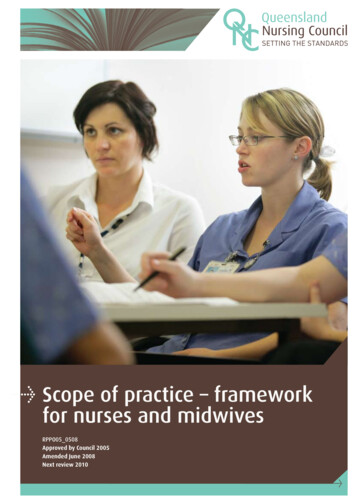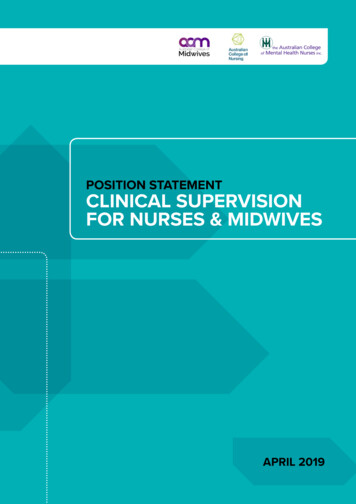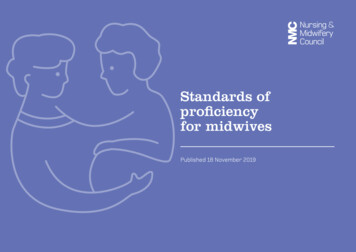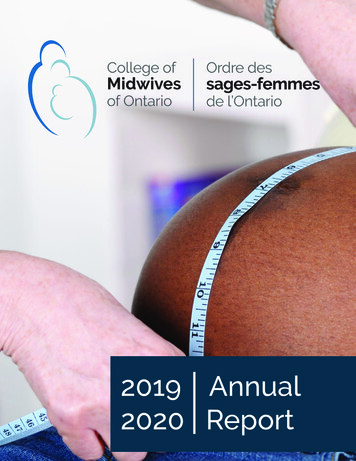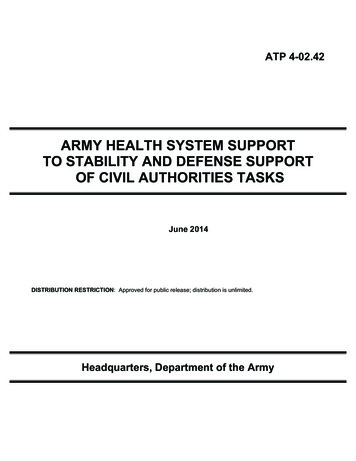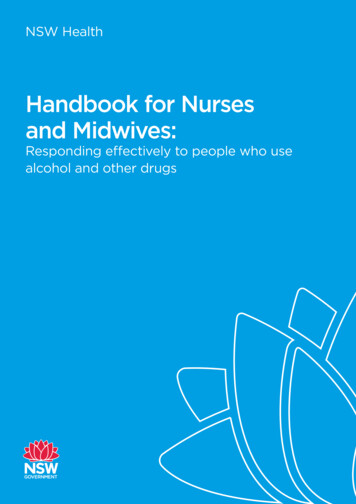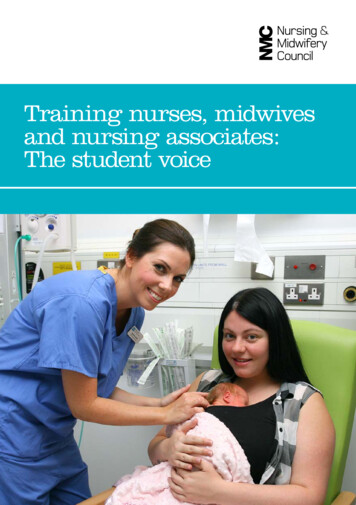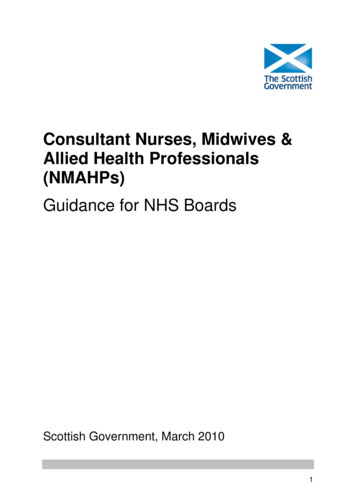
Transcription
Consultant Nurses, Midwives &Allied Health Professionals(NMAHPs)Guidance for NHS BoardsScottish Government, March 20101
Contents1. Introduction32. Background33. Principles of Consultant NMAHP posts44. Consultant NMAHP role45. Qualifications and expertise of appointees to Consultant NMAHP posts66. Approval process77. Procedure88. Record-keeping112
1. IntroductionConsultant nurses, midwives and allied health professionals (NMAHPs) make anincreasingly important contribution to the development and delivery of health andwellbeing services. Following the release in early 2009 of the NHS Scotland CareerFramework Guidance1, CNO Directorate and Health Workforce colleagues in SGHDare keen to support the consistent and sustainable implementation of ConsultantNMAHP roles across NHS Scotland.Linked to parallel guidance on Advanced Practice Nursing roles, this new guidancesets out for NHS Boards the context for Consultant NMAHP posts and the processesthrough which they should be established in the future.It must be emphasised, however, that it is for NHS Boards to determine where theseposts should be established in light of service needs and to develop detailed job andperson specifications appropriate to the competencies required to fulfil the role.Boards should look at all aspects of service development, delivery and governancein the process. This means that, when reviewing or considering the development of aConsultant NMAHP role, Nurse and AHP Directors must consider: service needs assessment, including local and national drivers; how anticipated impact can be articulated, including key deliverables and howthey will be delivered; evidence of support of key stakeholders; sustainability; and robust governance and accountability arrangements.2. BackgroundConsultant posts for nursing and midwifery were introduced in Scotland in 1999, andfor the allied health professions in 2002. The Scottish Executive Health Departmentcirculated guidance on Consultant posts to NHS Scotland in 1999 and 2001 (nursingand midwifery) and in 2003 (allied health professions).Several drivers that have appeared since then are now having a significant impacton the development of Consultant roles, including: emerging expert practice roles; Better Health, Better Care: Action Plan; A Force for Improvement; Curam; The National Quality Strategy; Modernising Nursing Careers, Midwifery 2020 and Modernising HealthcareCareers The NHS Career Framework, service redesign and role development; and pay modernisation, especially the implementation of Agenda for 93/0083002.pdf3
With over one hundred Consultant NMAHP roles now in place across NHS Scotland,the Chief Nursing Officer (CNO) and Chief Health Professions Officer (CHPO)believe it is now time for joint guidance on Consultant posts for nurses, midwives andallied health professionals to be disseminated. They have previously established anational working group with representatives from NHS Scotland, the ScottishGovernment, the Scottish Workforce and Staff Governance Committee, NHSEducation for Scotland and Higher Education Institutions (HEIs) to create this newguidance to support NHS Boards to develop Consultant posts.3. Principles of Consultant NMAHP postsConsultant NMAHP posts are underpinned by a number of key principles.Consultant NMAHPs will: contribute to better outcomes for patients, families, carers and communities; improve patient pathways and service delivery through influence andinnovation at strategic level; sit within a range of models of practice, teams, settings and serviceconfigurations; exercise advanced levels of clinical judgement, knowledge and experience; participate in, and influence, practice and service decision-making at NHSBoard, regional and national level; and in order to enhance practice, seek development through a range of routes andopportunities to ensure an education and career pathway supported by theNHS Career Framework, the Agenda for Change pay modernisation principlesand the Knowledge and Skills Framework (KSF).NHS Boards should take these underpinning principles into consideration whendeveloping Consultant posts.4. Consultant NMAHP roleIt is anticipated that Consultant NMAHP posts will be structured around four keythemes: clinical/professional leadership; expert practice; policy and service development, research and evaluation; and education and professional development.Clinical /professional leadershipConsultant NMAHPs are expected to contribute to national, as well as local,developments in their recognised area of expertise.The Consultant role must encompass the key skill of “effective communication”. Thepost-holder must have proven ability in motivating and inspiring others, includingother staff groups and organisations, to deliver the highest quality of care within their4
field of practice and beyond. Consultant NMAHPs must be in a position to challengeorganisational and professional barriers that limit or inhibit effective service delivery.Consultants will need to be able to effectively process complex, sensitive orcontentious information in contributing to the development of strategic planning atlocal and national levels. Their contribution to strategic planning will drive servicechange within and across health care organisations and across organisationalboundaries and systems, where appropriate.Post-holders may find themselves responsible for leading or managing clinical stafffrom other professions, depending on how the role is developed locally. NHS Boardsmust ensure that staff from other professions continue to receive profession-specificleadership and supervision to comply with professional regulations and to meetclinical governance requirements. It will be up to individual NHS Boards to set outappropriate management and accountability arrangements to support the Consultantrole (and their team if appropriate), taking account of the senior level of these posts.Expert practiceExpert practice is a key element of the Consultant NMAHP role. Consultants workwithin multidisciplinary teams across organisational, professional and agencyboundaries and possess a high degree of personal and professional autonomy inmaking complex clinical decisions. Consultant NMAHPs are expected to lead andinfluence service and policy development at strategic level while continuing toprovide a strong clinical commitment and expert advice to clinical colleagues.Policy, service development, research and evaluationConsultant NMAHPs will work with colleagues to provide direction for professionalpractice and service improvement. This part of their function will involve thedevelopment and implementation of policies, key recommendations and evaluationstrategies to improve services at local and national level. Consultants will be able toarticulate the impact of developments they have initiated and will contribute toevaluations of service provision, which in turn may lead to service redesign and theintroduction of new models of care. In this way, Consultant NMAHPs will play theirpart in ensuring that new ways of working are evidence-based and person-centred.Consultants will make a significant contribution to the health research agenda by: analysing, synthesising and interpreting the evidence base to underpinpractice within their clinical area; ensuring that services are based on high-quality evidence; identifying gaps in the evidence base and communicating their findingsto appropriate clinical, policy and research communities; initiating, facilitating or undertaking appropriate high-quality research; collaborating with appropriate research partners; gathering, collating and communicating appropriate clinical data toenable audit, service evaluation and clinical research; evaluating service developments resulting from the role and openingthe results of their evaluations to peer review; and5
developing a research culture within the NMAHP community, acting asrole models, establishing appropriate policies and ensuring support forclinical research activity.Education and professional developmentConsultant NMAHPs, in partnership with clinical leaders, managers and educators,will promote and facilitate positive learning environments and influence the strategicdevelopment of organisational learning to enhance patients’ experiences of services.Consultant NMAHPs will also: support others in achieving their potential by acting as coaches, mentors androle models; work with key stakeholders, including HEIs and other education providers, todevelop and promote a range of learning opportunities; and demonstrate a commitment to lifelong learning and take responsibility formeeting their own development needs.Regarding the professional/operational management of Consultant NMAHPsthemselves, it is seen as essential that there is clear management support for suchroles within the professional structure which ensure operational commitment withoutconstraining the wider innovation and development elements of the role.5. Qualifications and expertise of appointees to ConsultantNMAHP postsIndividual person specifications for NMAHP Consultant posts will outline theessential competencies required. The nature and context of Consultant NMAHPposts demand that post-holders have: extensive clinical expertise; strategic awareness; career-long learning and development; an active engagement with research and evaluation; and formal education links with an education establishment.The post holder should also have experience in presenting and contributing to local,regional and national professional conferences, special interest groups and/orworking parties, research experience and a substantial contribution to scholarshipand relevant publication.Defining the appropriate academic level of educational programmes to supportConsultant level practice has generated considerable debate, and we are aware thatmany practitioners and service leads are wary of some kind of ‘grade inflation’. Theissue is further complicated by the different professional development pathwaysacross Nursing, Midwifery and the Allied Health Professions. Nonetheless, theexpectations of Consultant level practice, as identified by the key functions, are suchthat preparation to SCQF11/12 are appropriate requirements and that post-holderswith such an underpinning will be more likely to be able take forward, sustain andfully develop these roles.6
The implementation of such roles has so far been limited by a failure to benchmarkthe level of academic development required at this level of practice and to preparepractitioners appropriately so that we are able to consistently recruit to newposts/roles or succession plan for existing roles. The mapping of academic levels toNHS Career Framework levels (appendix 2) acknowledges the current context, butalso articulates a developmental position.Therefore, whilst recognising the transitional phase of development for this roleacross professions, the principle is that the Consultant NMAHP post-holder will havea Master’s degree and, where relevant to the expectations of the post, will bepursuing doctoral level studies or equivalent activity. In addition, the post-holdermust be able to evidence a level of competency that allows them to undertake theduties and role described above.6. Post Approval process for NHS Scotland BoardsPreviously, a central national process of approval of initiatives supporting thedevelopment of new Consultant NMAHP posts has been in place to ensure that thecore criteria of the role have been met. This process, coupled with evidence fromother evaluations, has revealed a number of key factors regarding the success of thepost.These include: evidence of service need extensive early engagement with key stakeholders; partnership and leadership with other Consultants (such as physicians andgeriatricians); robust governance and accountability arrangements; robust evaluation of service impact delivered through the role; and evidence of an effective contribution to ongoing developments at nationallevel.We are keen to support a nationally consistent, but locally governed, process ofapproval for the development of advanced practice nursing posts and therefore seekto support robust decision making regarding both the establishment of such postsand the use of the ‘Consultant NMAHP’ title. Indeed, the Agenda for Change paymodernisation initiative makes it possible to match existing NMAHP job descriptionsto national profiles labelled “Consultant”, but job evaluations can also be carried outthrough local evaluations.Some posts evaluated through local mechanisms may emerge with similar paybands and post content to those matched to the national Consultant profiles; the jobevaluation scheme is therefore a suitable and sufficiently robust mechanism bywhich to assess Consultant posts and uses very similar criteria to those described inthis national guidance. It allows NHS Boards to adopt consistent approaches to localaccreditation of the use of the Consultant title by taking national guidance intoaccount, but without the need for recourse to a central approval mechanism.From experience so far Consultant level NMAHP posts based on the key criteriahave been matched between AfC Bands 8(a) and 8(d)/9. This reflects the different7
roles and levels of accountability currently associated with such posts. It isacknowledged that the level of activity for the domains described above will varyaccording to the expectations of the post and that a Consultant NMAHP rolematching to AfC Band 8(d) will have a different role from one matched at 8(a).Nevertheless, all posts using the title of Consultant NMAHP should meet the four keyfunctions identified previously.Therefore it is important to note that; No NMAHP posts below Band 8a should be permitted to use the ‘Consultant’title since the post would not meet the level of knowledge, training andexperience to be able to undertake the role. There are a number of NMAHP posts which may be matched to AfC Band8(a) and above, but are not focused on the Consultant level practice themese.g. professional manager, education lead. There may be posts in specific contexts where the Consultant level criteriaapply but where particular additional responsibilities are also included andthus AfC matching may be to a higher banding.Importantly, existing AfC mechanisms exist to support job matching for new postsand also allow for the establishment of training posts, linked to structured education,through which practitioners can be supported to meet particular outcomes and roleexpectations. Therefore, this guidance seeks not to limit NHS Boards in thedevelopment of specific posts, but to provide a benchmark for this important level ofpractice.This should support NHS Boards to adopt consistent approaches to localgovernance around the use of the term Consultant NMAHP without the need forrecourse to a central approval mechanism. To support local and national planning,and in line with national guidance, NHS Boards should maintain appropriate recordsfor audit and planning purposes and these should be linked to the national SWISSdata.7. ProcedureDevelopment of new post/service redesignNHS Boards will need to determine whether new NMAHP posts are required at“Consultant” level by considering the provisions of this national guidance and thefollowing (see Figure 1.): Service needs analysis and the submitted case for establishment of the newpost;Proposed job description and KSF outline for the post; andLocally evaluated summary report for the post with CAJE numberIf the Board considers that the new NMAHP post should be afforded the title“Consultant”, details of the post should be recorded and maintained at Board leveland collated and held centrally on Scottish Workforce Information Standard System(SWISS) to allow national review and analysis through ISD.8
Existing Post HoldersAs part of the annual PDP/KSF process both practitioners and line managers shouldreview job descriptions, roles, responsibilities and objectives. The followingopportunities arise; If, on review, a post is recognised as matching the NMAHP Consultantcriteria, then this can be acknowledged through use of the title.If a post does not match, but the practitioner identifies a desire to ‘worktowards’ such a role, then the PDP can reflect this development. Importantly,such individual development will not automatically result in any re-designationof the post or post holder, but it does support succession planning for furtherNMAHP Consultant roles.Decision making process and infrastructureThis guidance sets out to support greater governance regarding the implementationof NMAHP Consultant roles across Scotland, but does not seek to create additionalbureaucracy or parallel HR processes.Whilst it is acknowledged that a commitment to robust PDP/KSF review for allexisting and aspirant NMAHP Consultants will require significant engagement it is akey element of the national AfC agreement and is likely to streamline, expedite andensure consistency on processes across Board areas. This is particularly importantgiven the increasing number of posts/job titles which currently either make referenceto ‘Consultant’ or might be considered to be at that level. The NES SuccessionPlanning Pathway process and the proposed regional implementation support isdesigned to support such decision making and to provide routes for practitionerdevelopment.Recognising that we are in a transitional position with regard to the roll-out and useof these types of posts we anticipate that this process can be managed over astaged timescale for existing posts, linked to annual reviews, and that all new postsshould be routinely planned in this way, with opportunities for ‘training/development’posts to be established to encourage skills/competence acquisition.Such a staged approach, linking the national guidance to appraisal and the annualPDP process should support both individual practitioners and managers by matchingthe role development clearly to the job profiles and KSF outlines for the post.9
New NMAHP Consultant post proposalJob description and KSF outline agreedLocally evaluated todetermine AfC band, in linewith agreed local procedurefor evaluating postsMatched to AfC NationalConsultant profile for theappropriate profession, inline with agreed localmatching procedureComparison of bandoutcome to theNational NMAHPConsultant profile forthe professionConsultant NMAHPpost proposedNHS Board NMAHP Consultant agreement/review processConsideration by NHS Board of proposals for NMAHP Consultant postsusing the national evidence and the following processes: Service need analysis job description; KSF outline; matched job report (CAJE number), or; local evaluation report (CAJE number), or; Education/Development plan (for training posts).Approval decisionPost CreatedInformation held by NHS Board/SWISS10
8. Record-keepingIn accordance with the management of Agenda for Change and as part ofestablished processes, the following documents should be held by NHS Boards toprovide an audit trail of local decision-making: job description and rationale/business case for the post;matching or locally evaluated summary report for the post with CAJE number;KSF outline for the post;KSF-based personal development plan for the individual in the post;local record of those NMAHP posts for which the use of the “Consultant” titleis approved within the NHS Board. Nature and number of NMAHP Consultant posts to be reflected in the Boards’SWISS data11
Appendix 1 - NHS SCOTLAND CAREER FRAMEWORK MODELSKILLS&COMPETENCIESLEARNING&DEVELOPMENTLEVEL 9 – (MORE SENIOR STAFF)Staff with ultimate responsibility for decision-making and full on-callaccountability.9LEVEL 8 – (CONSULTANT PRACTITIONERS)Staff working at a very high level of clinical expertise and/or haveresponsibility for planning services.Non-clinical examples might be, for example ‘Divisional Manager’.8LEVEL 7 – (ADVANCED PRACTITIONERS)Experienced clinical practitioners with high level of skill and theoreticalknowledge. Will make high level clinical decisions and manage ownworkload.Non-clinical staff will typically be managing a number of service areas.7LEVEL 6 – (SENIOR PRACTITIONERS)A higher degree of autonomy and responsibility than level 5 in the clinicalenvironment.Non-clinical staff who would be managing one or more service areasLEVEL 5 – (PRACTITIONERS)Registered practitioners consolidating pre-registration experience andgetting ready for a higher level of functioning.Non-clinical examples might include Management Acccountant65LEVEL 4 – (ASSISTANT PRACTITIONERS)Some work involving protocol based care under the supervision of aregistered practitioner.Non-clinical roles can include IT support worker and Technician.4LEVEL 3 – (SENIOR HEALTHCARE SUPPORT WORKERS)Higher level of responsibility than Healthcare Support Worker.Non-clinical roles can include ward clerk and community food worker.3LEVEL 2 – (HEALTHCARE SUPPORT WORKERS)Works under the direction and supervision of healthcare professionalsand supports the multidisciplinary team in the delivery of high quality careNon-clinical examples are housekeeper and receptionist.LEVEL 1 – (SUPPORT WORKERS)Non-clinical staff in roles that require very little formal education such ascatering assistant or domestic assistant.1221
Appendix 2. Relationship between Academic and Career Framework levels.(NHS Scotland Career Framework Guidance 2009)13
Consultant posts for nursing and midwifery were introduced in Scotland in 1999, and for the allied health professions in 2002. The Scottish Executive Health Department circulated guidance on Consultant posts to NHS Scotland in 1999 and 2001 (nursing and midwifery) and in 2003 (allied health professions).
